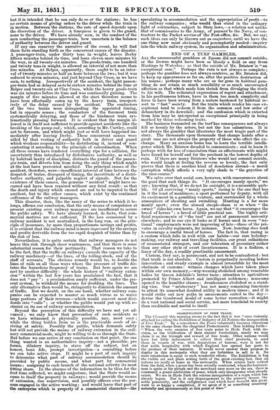END OF A TURF GAMBLER..
ALL the unsuccessful gamblers at Epsom did. not commit suicide, or the Downs might have been as bloody a field, as any from Hastings to Waterloo • so that the suicide of Mr. Bristow is " an exceptional case." Prhaps the rain is not always so complete ; perhaps the gambler does not always contrive, as Mr. Bristow did, to keep up appearances so far on, after the positive destruction ofi his. means ; perhaps many who are as far gone in habitual gams bling do not retain so much sensibility or so• much uncorrupted affection, as that which made hinr shrink from divulging the truth. to his wife. The reiterated expressions of regret and attachment, in his posthumous letters, have in them too much simplicity and force to have been wrung from a nature hardened by habitual re- sort to " fast " society. But the traits which render his case ex- ceptional tend to redeem it from the common and low order of debauchery in its downfall; and the confession which is extorted from him may be interpreted as exceptional principally in being marked by those redeeming traits.
The business transacted on the turf has consequences not always felt so keenly by the actors, but not the less calamitous. It is not always the gambler that illustrates the most tragic part of the story. The thousands upon thousands that change hands after a great race are not always the property of those who effect the ex- change. Many an anxious home has to learn the terrible intellis gone which. Mr. Bristow dreaded to communicate ; and to learn it perhaps with far less of consolation than an affectionate. wife might have found for herself and for the penitent in.the lowest depths of ruin. If there are many Bristows who would.not commit suicide, who would laugh at feeling the reverse so keenly, the Act only proves that there is another kind of desolation abroad—a moral corruption which affords a very ugly shade to " the gayeties of the race-course."
We salve over that social sore, however, with reassurances about. the good that such things do. " encourages manly sports," we. say; knowing that, if we do not lie outright, it is a miserable qnib- ble. Of all surviving " manly sports," racing is the one that has in it the least of manliness; a sport performed by deputy, with all its excitement in a gambling venture, and surrounded by a whole atmosphere of cheating and swindling. Haunting is a far more manly sport ; even the abused. steeple-chase is so when " the owner" rides his own horse. Again, we say that " it encourages the breed of horses "; a breed of little practical use. The highly arti- ficial requirements of "tie turf" are not of paramount necessity elsewhere; and to our eye it looks as if horses used in seine " na, tional" employments were not improving of late—those of the pri- vates in Cava regiments, for instance. Now, hunting does tend: to encourage a useful breed of horses. The fact is, that racing is-. a custom which falls in well with our habits—our rare holyday- making, our railway and. travelling facilities, our great collections• of unassociated strangers, and our toleration. of pecuniary rather than any other style of overt licentiousness. It is a fashion, a fancy of the day, a readily practicable amusement. Custom, they say, is paramount, and not to be contradicted : but that truth is not absolute. Custom is perpetually receding before innovation ; and steady example is almost irresistible by the most obstinate of customs : witness changes which have taken place within our own memory,—wig-vrearing abolished among venerable ladies by Queen Adelaide's better taste.; attention to agriculture promoted by Prince Albert and intelligent noblemen; museums- opened to the humbler classes ; drunkenness abolished as a. stand- ing vice. Our " aristoeraey " has not many remaining functions to attest its- somewhat doubted utility in modern times;. and if it would strike out new paths in amusements suited. to the day— devise the Goodwood model of some better recreation—it might do a vast national, and social service, not more beneficial: to society than creditable and useful to itself


























 Previous page
Previous page